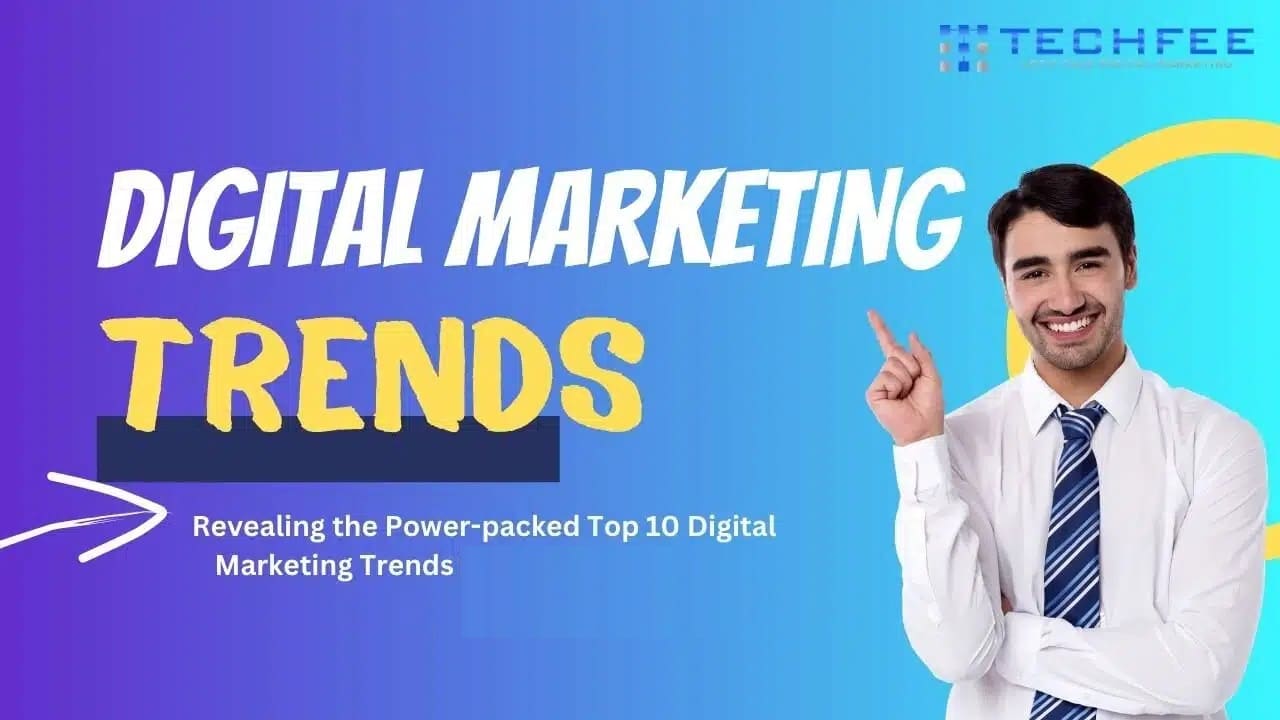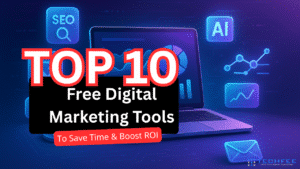Are you eager to explore the exciting kingdom of B2B digital marketing trends 2024 and uncover the top strategies for 2024 and beyond? If so, you’re in for a treat! This article will unveil the most impactful B2B digital marketing trends shaping the industry’s landscape. But before we dive into these cutting-edge trends, let’s start by understanding the essence of B2B digital marketing and why it is crucial to stay up-to-date with the ever-evolving marketing strategies.
Simply put, B2B digital marketing refers to the strategies and techniques used by businesses to promote their products or services to other businesses through online channels. This includes leveraging digital platforms like search engines, social media, email, and content marketing to connect with potential customers, generate leads, and drive sales.
In today’s fast-paced world, where technology advancements continue to reshape the business landscape, B2B digital marketing has become an indispensable tool for companies striving to thrive in the competitive marketplace.
Why is it essential to keep pace with B2B digital marketing trends? The answer lies in the power of adaptation. As consumer behaviors, technology, and market dynamics grow, so do the strategies and tactics that drive successful marketing campaigns.
By staying informed about the latest trends, businesses can gain a competitive edge, effectively reach their target audience, and maximize their return on investment. In this ever-changing digital landscape, embracing innovation and staying up-to-date with the latest trends are the keys to unlocking new opportunities and achieving sustainable growth.
But wait, the top 10 B2B digital marketing trends we’re about to reveal aren’t just theoretical predictions. They are derived from insights provided by industry experts, market research, data-driven analysis, and real-world success stories.
As we delve into each trend, you’ll gain valuable knowledge and practical tips to implement in your marketing strategies. So, without further delay, let’s embark on this exciting journey to uncover the top 10 B2B digital marketing trends for 2024 and beyond. Together, we will equip ourselves with the tools and insights needed to thrive in this ever-evolving digital landscape.
Remember, the future of B2B digital marketing is already at our doorstep, and those who seize the opportunities presented by these trends will position themselves for success. Continue reading this post as we unveil the strategies and techniques that will shape the industry in the future.
Get ready to revolutionize your B2B marketing approach and propel your business to new heights. The future awaits, and it’s time to stay one step ahead in B2B digital marketing. Let’s get started!
Top 10 B2B Digital Marketing Trends 2024
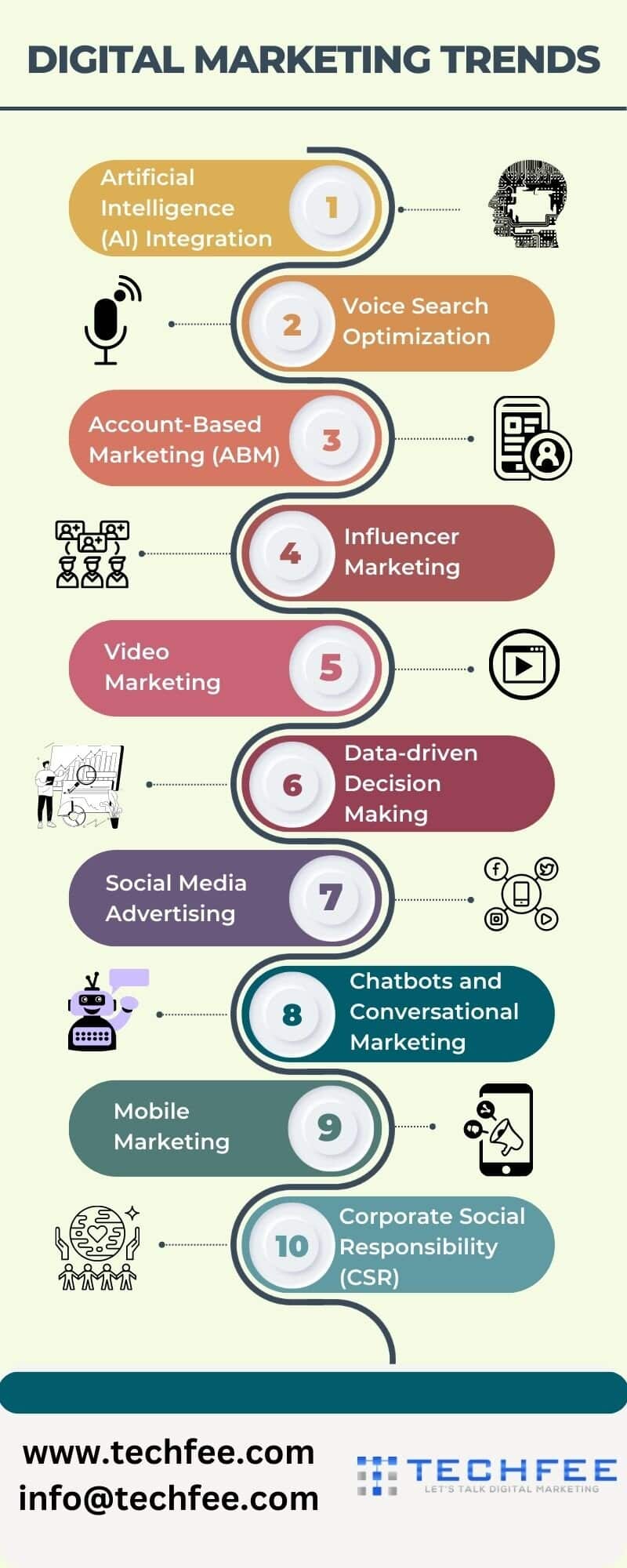
Trend 1: Artificial Intelligence (AI) Integration
AI integration has become a significant B2B digital marketing trend, ultimately transforming how businesses connect with their target audience. One of the critical aspects driving this trend is the utilization of AI-powered automation, which empowers companies to streamline and optimize their marketing processes.
Businesses can efficiently analyze vast amounts of data by leveraging AI algorithms and identifying significant patterns and trends. This automation capability enables B2B marketers to automate repetitive tasks like data entry, lead scoring, and email campaigns. With the time and resources saved, marketers can shift their focus toward strategic initiatives and creative endeavors that promote business growth and innovation.
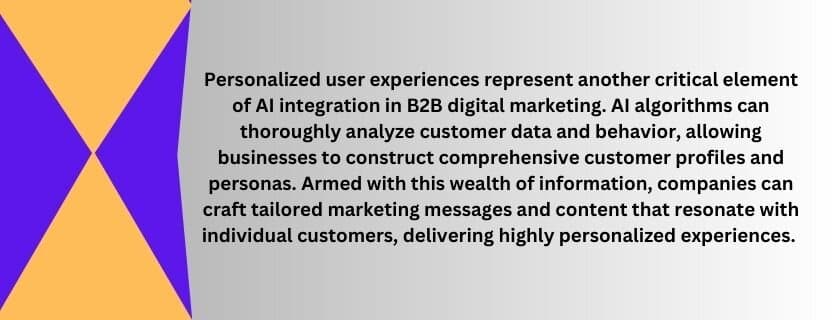
The predictive capabilities of AI further enhance these efforts by enabling B2B marketers to expect customer needs, recommend relevant products or services, and provide targeted offers. This level of personalization not only enhances customer satisfaction and loyalty but also drives higher conversion rates and revenue growth.
Moreover, AI integration in B2B digital marketing enables real-time data analysis and decision-making. AI algorithms are trained to process and analyze extensive datasets from multiple sources, such as customer interactions, social media, and market trends.
This valuable capability empowers businesses to gain actionable insights into their target audience, competitors, and overall market dynamics. With this knowledge, B2B marketers can make data-driven decisions, refine their marketing strategies, and optimize their campaigns for better results.
AI-powered analytics also support ongoing monitoring and performance tracking, enabling marketers to swiftly identify and respond to emerging trends and changes in customer behavior.
In short, Artificial Intelligence integration in digital marketing trends offers transformative benefits through AI-powered automation and personalized user experiences.
Trend 2: Voice Search Optimization
Voice Search Optimization is a rapidly growing trend in B2B digital marketing, driven by the increasing majority of voice assistants and the widespread adoption of voice-enabled devices. As voice assistants like Siri, Alexa, and Google Assistant become standard fixtures in homes and workplaces, businesses realize the importance of optimizing their online presence for voice searches.
This optimization necessitates implementing strategies explicitly tailored to the distinctive characteristics of voice search queries. Unlike traditional text-based searches, voice searches are more conversational, longer, and incorporate natural language patterns.
To optimize effectively for voice search, businesses must prioritize long-tail keywords and phrases that mirror how people naturally speak. Understanding user intent and providing concise, direct answers to common questions are essential to a successful voice search optimization strategy.
Furthermore, optimizing website content for featured snippets can significantly enhance visibility in voice search results. Local SEO is also crucial because voice searches often include location-based inquiries.
Businesses can improve local search rankings by ensuring consistent business information across directories and utilizing schema markup.
Optimizing page load speed, ensuring mobile responsiveness, and delivering clear and concise information can enhance the overall user experience and bolster voice search optimization efforts.
With the ever-increasing popularity of voice assistants, businesses that proactively adapt their digital marketing strategies to accommodate voice search will gain a competitive edge, effectively reaching their B2B audience in a world where voice commands are swiftly becoming the new norm.
Trend 3: Account-Based Marketing (ABM)
Account-Based Marketing (ABM) has gained significant traction as a prominent B2B digital marketing trend, transforming how businesses approach their marketing strategies.
At its core, ABM entails a focused marketing approach that concentrates on engaging and nurturing specific high-value accounts instead of employing a broad approach aimed at a wider audience.
This process empowers marketers to tailor their messages and content to cater to individual accounts’ specific needs and pain points, resulting in personalized and highly relevant experiences.
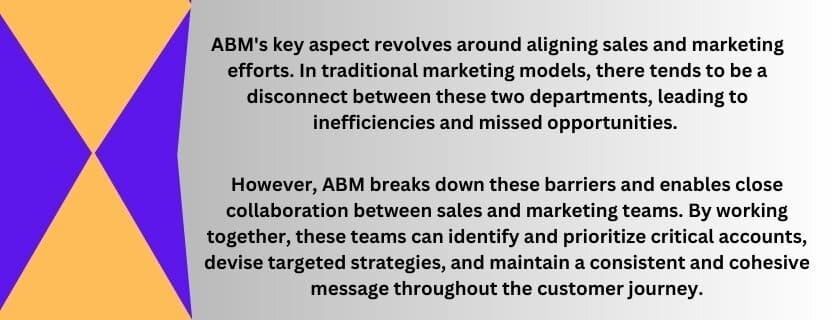
ABM encourages aligning sales and marketing teams by establishing shared goals and metrics, allowing them to measure success collectively. This collaboration ensures that both teams are synchronized, working towards driving revenue and business growth.
With ABM, sales and marketing teams can develop an in-depth understanding of their target accounts, including their pain points, challenges, and purchasing behaviors. With this knowledge, they can craft highly personalized campaigns and deliver the right message to the appropriate decision-makers within the target accounts at the right time.
Moreover, ABM enables businesses to utilize their resources more efficiently and effectively. Since ABM concentrates on a select number of high-value accounts, marketers can strategically allocate their budget and resources, investing in initiatives that are most likely to generate revenue.
This approach optimizes marketing efforts by eliminating wasteful spending on unqualified leads and maximizing the return on investment (ROI).
Another significant advantage of ABM is its ability to facilitate stronger customer relationships. By personalizing the marketing experience for each account, businesses can demonstrate their understanding and commitment to meeting the specific needs of their clients. This tailored approach cultivates trust and credibility, ultimately enhancing customer loyalty and increasing lifetime value.
Trend 4: Influencer Marketing
Influencer marketing has gained significant traction within B2B digital marketing, providing businesses with a strategic avenue to engage their target audience effectively. One of the critical elements of this trend involves collaborating with industry experts to act as influencers.
By partnering with influencers who have established themselves as authoritative figures in their respective domains, B2B companies can leverage their expertise and credibility to elevate their brand image.
These influencers possess a wealth of knowledge and experience, making their endorsements and recommendations exceptionally valuable to the target audience. Their insights and opinions serve as valuable assets, helping businesses expand their reach to a broader audience, including decision-makers and influential stakeholders within the industry.
Moreover, influencer marketing in the B2B empire offers a powerful means of cultivating trust and credibility. By aligning their brand with reputable influencers, businesses can enhance their credibility and establish trust with their target market. This holds immense importance in B2B marketing, where trust is pivotal in decision-making processes.
When industry experts endorse a product or service, their credibility seamlessly transfers to the brand, reinforcing its reputation and dependability. Through influencer marketing, businesses can effectively navigate the initial skepticism often present in B2B transactions, thereby expediting the buyer’s journey.
Additionally, influencer marketing enables B2B companies to tap into the authenticity and personal connection that influencers establish with their audience. Influencers are often regarded as trustworthy sources of information, so their endorsements are perceived as genuine recommendations rather than heinous advertisements.
This authenticity resonates with the target audience, fostering a sense of relatability and significantly increasing the likelihood of engagement. Businesses can cultivate enduring customer relationships by forging these connections, resulting in heightened customer loyalty and advocacy.
Trend 5: Video Marketing
Video marketing has become one of the emerging trends in digital marketing due to the rushing popularity of video content. Businesses have recognized the immense potential of videos in captivating and engaging audiences, as they offer a powerful medium for effectively conveying complex information in a visually appealing and easily digestible format.
The adoption of video-sharing platforms like YouTube, Vimeo and social media platforms like Facebook, Instagram, and LinkedIn has further accelerated the demand for video marketing. These platforms provide businesses with expansive audience bases and extensive reach, enabling them to showcase their products or services to a broader demographic.
Moreover, technological advancements have made video creation and distribution more accessible for businesses. Smartphones, video editing software, and live-streaming capabilities have become more affordable and user-friendly, empowering enterprises to produce and share high-quality videos.
To leverage video marketing strategies effectively, businesses employ diverse strategies such as product demonstrations, customer testimonials, explainer videos, thought leadership content, and webinars. Each system serves a specific purpose, whether it involves educating potential customers, fostering trust, or demonstrating expertise within a particular industry.
As B2B digital marketing continues to evolve, video marketing is anticipated to remain at the forefront, driving customer engagement and influencing purchase decisions through its compelling and immersive nature.
Trend 6: Data-driven Decision Making
Data-driven decision-making has emerged as a top marketing trend in B2B digital marketing, revolutionizing how businesses approach their marketing strategies. The significance of data analytics cannot be exaggerated in this context.
By harnessing the power of data, businesses gain valuable insights into customer behavior, preferences, and market trends. Through comprehensive data analysis, companies can uncover patterns, correlations, and untapped opportunities that might go unnoticed.
These insights are a solid foundation for making informed decisions and formulating effective marketing strategies. Data analytics allows businesses to understand their target audience better, segment them into relevant categories, and personalize their marketing efforts, ensuring maximum impact and engagement.
Implementing effective data-driven strategies is the key to leveraging the potential of data analytics. To begin, businesses must collect and store relevant data from multiple sources, such as customer interactions, website analytics, social media, and sales records.
Organizing, cleaning, and standardizing this data is essential to ensure accuracy and consistency.
Moreover, enabling a data-driven culture within the organization is critical, where decisions are based on data and insights rather than subjective opinions or instincts. This requires training and upskilling employees in data analytics, promoting cross-functional collaboration, and establishing data governance frameworks.
With the proper infrastructure and skilled workforce, businesses can create a continuous improvement cycle where data insights are used to refine strategies, optimize campaigns, and achieve better marketing outcomes.
Trend 7: Social Media Advertising
Social media advertising has become a dominant trend in B2B digital marketing, offering an array of opportunities for businesses to connect with their target audiences. By harnessing the power of various social media platforms like LinkedIn, Twitter, and Facebook, B2B marketers can establish a solid online presence and extend their reach.
These platforms boast extensive user commands and various features that allow businesses to craft engaging and focused campaigns.
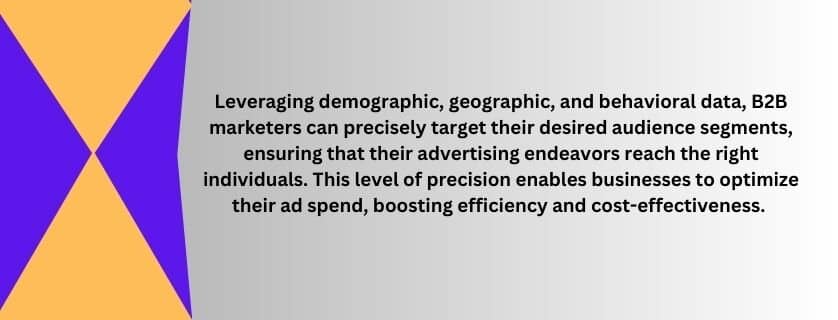
Moreover, social media advertising facilitates real-time engagement with B2B audiences, encouraging meaningful interactions and cultivating relationships.
Through compelling content, personalized messaging, and interactive elements, businesses can capture the attention and interest of their target audience, resulting in heightened engagement levels.
These recent trends in digital marketing highlight the significance of leveraging social media platforms, employing advanced targeting techniques, and actively engaging with B2B audiences to maximize the impact of advertising campaigns.
Trend 8: Chatbots and Conversational Marketing
Chatbots and Conversational Marketing have emerged as prominent trends in B2B digital marketing 2024, transforming how businesses interact with customers and enhancing their overall marketing performance.
With the rise of artificial intelligence and natural language processing like CHAT GPT have become intelligent virtual assistants capable of engaging in human-like conversations.
These sophisticated bots revolutionize customer interactions by providing instant responses, personalized assistance, and round-the-clock support.
By automating routine tasks and freeing up human resources, chatbots drive efficiency and accuracy in customer service. They seamlessly integrate with various systems, such as CRM platforms, enabling streamlined workflows and efficient data management.
Chatbots gather valuable insights through data analysis and machine learning algorithms, enabling businesses to deliver targeted recommendations and personalized experiences.
Trend 9: Mobile Marketing
Mobile marketing has become a well-known trend in B2B digital marketing due to the widespread adoption of mobile devices, the increasing focus on mobile-friendly strategies, and the advancements in mobile technologies.
The smartphone and tablet usage wave has revolutionized how businesses and consumers interact, making it crucial for B2B marketers to optimize their marketing efforts for mobile platforms.
To keep up with the competition, businesses realize the importance of tailoring their strategies to cater to the mobile-savvy audience. Optimizing websites, landing pages, and content ensures a seamless user experience across various mobile devices.
Additionally, businesses leverage mobile-specific features such as push notifications and location-based targeting to engage their target audience effectively.
Furthermore, the continuous advancements in mobile technologies, including the development of mobile apps and the integration of augmented reality (AR) and virtual reality (VR), have provided marketers with powerful tools to create personalized experiences and interactive content, ultimately enhancing brand visibility and customer engagement.
Trend 10: Sustainability and Corporate Social Responsibility (CSR)
In recent years, the business geography has noticed a remarkable shift towards sustainability and corporate social responsibility (CSR) in B2B digital marketing. This change is driven by various factors, including a growing awareness of environmental issues, evolving consumer preferences, and increased regulatory pressures.
Today, B2B businesses across diverse industries recognize the significance of integrating sustainable practices into their operations. It is no longer just about reducing their environmental impact but also about enhancing brand reputation and long-term profitability.
Incorporating CSR into marketing campaigns has become a crucial strategy for B2B firms aiming to stand out in a competitive market. By aligning their values with social and environmental causes, businesses can effectively communicate their commitment to sustainability, attracting customers who share the same values and fostering long-term loyalty.
One compelling approach B2B companies are adopting is transparent communication and storytelling. Digital marketing platforms offer ample opportunities to share engaging narratives about a company’s CSR initiatives.
Through captivating videos, blog posts, and social media campaigns, businesses can educate customers about their sustainability practices while establishing an emotional connection. This storytelling strategy informs consumers about the company’s sustainable efforts and cultivates a resonance, making customers more likely to support and advocate for the brand.
Furthermore, B2B firms are forging partnerships with nonprofits and other social impact organizations to amplify their CSR messages. Collaborating with established entities in the sustainability space lends credibility and authenticity to a company’s sustainability efforts, making it more appealing to environmentally conscious customers.
These partnerships can take various forms, such as joint campaigns, cause-related marketing initiatives, or co-creation of sustainable solutions. Such collaborations strengthen the brand’s reputation and foster trust among customers.
Moreover, B2B digital marketing strategies are evolving to prioritize transparency and accountability in sustainability reporting. Many companies now provide detailed information about their environmental impact, social initiatives, and progress toward sustainability goals on their websites and digital channels.
By being transparent about their practices, businesses build trust with their stakeholders, including customers, investors, and partners, who increasingly demand greater corporate responsibility.
Conclusion
In summary, the top 10 B2B digital marketing trends highlight the industry’s dynamic nature and adaptability’s importance. These trends emphasize the need for businesses to stay abreast of emerging technologies and evolving consumer behaviors.
Personalized marketing, powered by AI-driven automation, has become a game-changer, enabling businesses to connect with their target audience on a deeper level.
Social media platforms have gained significant traction, providing valuable opportunities for B2B marketers to engage and build customer relationships.
Additionally, the emergence of immersive technologies has opened up new avenues for delivering captivating experiences. Adapting to these trends is crucial for B2B marketers, as it allows them to stay ahead of the competition and meet the ever-changing demands of the digital landscape.
By embracing innovation and continuously evolving strategies, businesses can position themselves as industry leaders, providing exceptional value and experiences to their customers in the B2B.
Frequently Asked Questions
What is the definition of B2B digital marketing?
B2B digital marketing refers to businesses' strategies and tactics to promote their products or services to other companies through digital channels. It uses online platforms like websites, social media, email marketing, and search engine optimization to attract, engage, and convert potential business customers. The primary goal of B2B digital marketing is to build brand awareness, generate leads, and ultimately drive sales within the business-to-business context.
Why is it crucial for businesses to stay updated with digital marketing trends?
Businesses must stay updated with digital marketing trends because:
- Consumer behavior: Digital marketing trends reflect changes in consumer behavior, preferences, and expectations. By staying updated, businesses can effectively align their strategies to target and engage their audience.
- Competitive advantage: Digital marketing is highly competitive, and staying ahead of trends can provide a competitive edge. Adapting to new platforms, technologies, and techniques allows businesses to stand out and attract customers in a crowded marketplace.
- Cost-effective marketing: Digital marketing offers cost-effective strategies compared to traditional marketing methods. By staying updated, businesses can leverage emerging trends to optimize their marketing efforts, reach a wider audience, and generate better returns on investment.
- Improved targeting and personalization: Digital marketing trends often focus on data-driven approaches and audience segmentation. By staying updated, businesses can refine their targeting and personalization efforts, delivering tailored messages and experiences to their customers, leading to higher conversion rates.
- Evolving algorithms and platforms: Major digital platforms, such as search engines and social media, frequently update their algorithms and features. By keeping up with these changes, businesses can optimize their content and advertising strategies, ensuring maximum visibility and engagement.
- Enhanced customer experience: Digital marketing trends often emphasize enhancing the customer experience through improved website design, user interfaces, and interactive content. By staying updated, businesses can provide a seamless and enjoyable experience, fostering customer loyalty and positive brand perception.
- Measurement and analytics: Digital marketing provides extensive data and analytics capabilities. Staying updated with trends allows businesses to utilize advanced measurement tools and techniques, gaining valuable insights into campaign performance, customer behavior, and ROI, which can inform future strategies and decision-making.
Overall, staying updated with digital marketing trends helps businesses stay relevant, reach their target audience effectively, and achieve sustainable growth in today's digital landscape.
What are some effective social media advertising strategies for B2B companies?
Effective social media advertising strategies for B2B companies include targeted advertising, engaging content, influencer marketing, LinkedIn advertising, retargeting, RLSA, video advertising, customer testimonials, A/B testing, and data analysis for optimization.
What are the B2B social media trends for 2024?
The B2B social media trends for 2024 are personalized content, video marketing, influencer partnerships, employee advocacy, social listening, micro-communities, data-driven insights, chatbots, LinkedIn dominance, and social commerce.
What do marketers need to know in 2024?
In 2024, marketers need to know that personalized and authentic content is crucial for engaging with their target audience. They should leverage emerging technologies like AI and automation to deliver tailored experiences. Data privacy and compliance regulations must be prioritized to build trust with customers. Additionally, staying up-to-date with the latest digital marketing trends and platforms, such as voice search and social media algorithms, is essential for effective targeting and maximizing reach. Marketers should embrace innovation, prioritize customer experience, and adapt their strategies to the ever-evolving digital landscape.
What is the digital strategy for 2024
The digital strategy for 2024 focuses on personalized customer experiences through AI, automation, and data. It emphasizes mobile, voice search, and social media. Privacy, partnerships, and innovation are essential.
